Understanding Iftar Timings in Dubai: A Comprehensive Guide
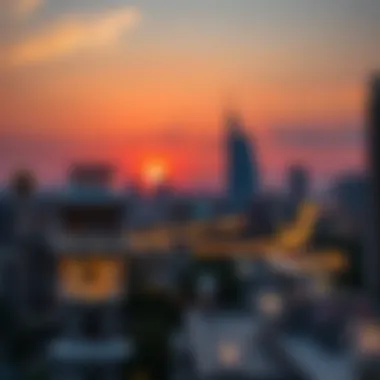
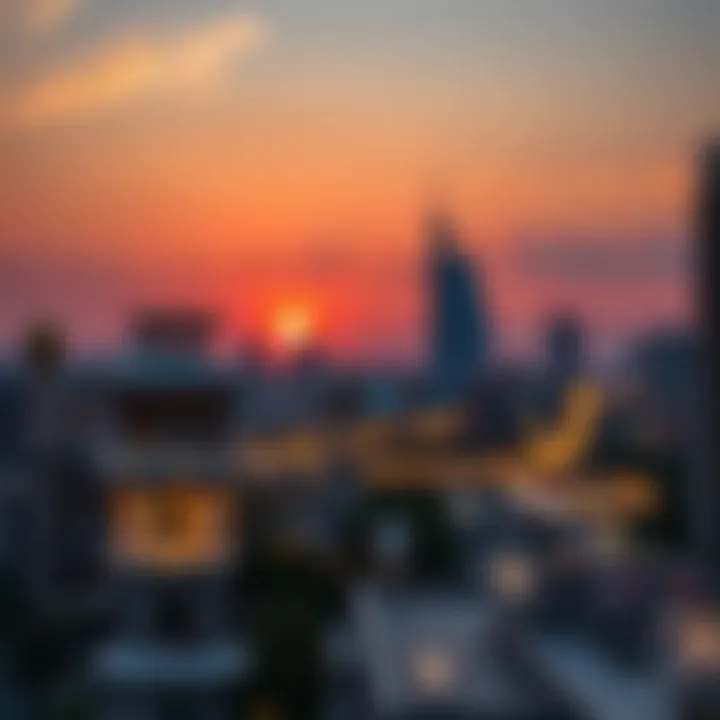
Intro
Iftar is more than just breaking the fast—it's a deeply ingrained practice, rich in cultural significance and community spirit, especially in a vibrant city like Dubai. As the sun sets during Ramadan, the air fills with the aromatic concoction of traditional dishes, symbolizing the end of another day of fasting. For both residents and visitors, understanding the timing and customs surrounding iftar is essential to fully appreciate the unique flavors of this holy month.
In Dubai, where modern skyscrapers meet historical traditions, the iftar experience can vary greatly. From bustling marketplaces to serene parks, the communal aspect of sharing a meal at sunset is a striking sight. But let's not sugarcoat it; the timings can differ and play a pivotal role in shaping the day's rhythm for many. This guide will explore the nuances of iftar timings in Dubai, detailing how they are determined, the factors that influence them, and the cherished traditions that accompany this moment.
As we breakdown the various elements involved, you'll gain a comprehensive understanding of the impact these timings have on daily life during Ramadan. Whether you’re looking to join in the communal celebrations as a visitor or seeking insight as a resident, knowing the ins and outs of iftar timing is crucial. So, buckle up as we navigate through the intricate layers of this rich cultural phenomenon.
Significance of Iftar in Dubai
Iftar marks not just the end of a long day of fasting, but it also holds profound significance in the social and cultural fabric of Dubai. As the sun dips beyond the horizon, bringing an end to one's day of abstaining from food and drink, this moment becomes a cherished ritual that embodies community, faith, and tradition.
Iftar transcends mere nutrition. It serves as a powerful symbol of sharing and generosity, reflecting the essence of Ramadan. In a city as vibrant and diverse as Dubai, the practice of gathering for iftar reinforces social bonds. Friends, family, and neighbors come together for this meal, often inviting those who might be away from kin—like expatriates and newcomers—to break bread in unison. It’s not just about quenching hunger; it’s about breaking barriers and fostering unity among diverse cultures, creating a mosaic of shared experiences.
Furthermore, the meal itself is steeped in cultural customs. Traditional dishes play a pivotal role, transforming iftar into a banquet of flavors. From dates and laban to hearty biryani or samosas, each dish tells a story, carrying memories of generations past. The act of preparing and sharing these meals is a gesture of love and community spirit.
"Iftar, in its essence, teaches the value of patience and gratitude, as well as the importance of giving back to those who may be less fortunate."
In a city where cultures intermingle, Iftar events become something of a social calendar highlight, drawing people from all walks of life. Local businesses and hotels often run special iftar promotions, showcasing culinary craftsmanship while ensuring that the essence of the tradition is upheld.
Ultimately, the significance of iftar in Dubai is multifaceted. It is a time for reflection, a reminder of one’s faith, and an opportunity to connect and strengthen relationships. Recognizing this significance is essential for anyone looking to grasp the local culture and the spirit of Ramadan, a holy month that resonates deeply with the heart of Dubai.
Cultural Background
The cultural landscape of Dubai is vastly enriched by the practice of iftar. Historically, the tradition of breaking the fast is rooted in Islamic customs and has evolved over the years, reflecting the influence of various cultures that have made Dubai their home. The city, known for its hospitality, opens its doors to people from around the globe, and this melting pot of cultures is mirrored in the diverse dishes served during iftar.
Local markets buzz with activity as families prepare for this special occasion, purchasing ingredients, and often opting for traditional delicacies that reflect their heritage. Not only does this support local businesses, but it also fosters a strong sense of community.
Today, iftar tables in Dubai display an eclectic mix of traditional Arabic dishes alongside cuisines from across the globe, showcasing the city's unique ability to blend tradition with modernity.
Religious Importance
Iftar holds significant religious importance for Muslims, marking the daily conclusion of fasting during Ramadan, which is one of the Five Pillars of Islam. The act of fasting is seen as a means of spiritual growth, self-discipline, and empathy towards the less fortunate.
As the Maghrib prayer calls out, the bellies that have gone through the day without sustenance respond eagerly. It is a moment of gratitude, honoring the strength to fast and the blessing of community support. For many, it prepares them spiritually for prayers and reflection throughout Ramadan. Each date consumed at iftar not only revitalizes the body but also reconnects the person with their faith.
Thus, understanding the layers of significance surrounding iftar in Dubai reveals how this practice stitches together threads of culture, community, and faith. It’s a celebration that revolves around more than food; it encapsulates a deeper message of hope, empathy, and togetherness.
How Iftar Times Are Determined
Determining the Iftar times during Ramadan is no small feat—it's more than just a simple clock-watching event. The significance of this topic, especially in a vibrant city like Dubai, lies in the intricate interplay of tradition, religious practice, and scientific observation. Iftar, the meal that breaks the fast at sunset, is very much a focal point of daily life during this holy month. The timing has implications not just for those observing the fast but also influences social engagements, community events, and even business hours. Understanding how Iftar times are set offers a deeper appreciation of Ramadan's cultural and religious fabric in Dubai.
The Role of Astronomy
Astronomy plays a fundamental role in determining the exact timing of Iftar. The fast is broken at sunset, which is marked by the disappearance of the sun below the horizon. While this seems straightforward, it’s far from it. Each day is unique, and therefore, precise calculations are required. Many mosques in Dubai and across the UAE rely on specialized astronomical tables that indicate sunset times throughout Ramadan. Additionally, local observatories and organizations keep track of the sun’s position, ensuring that the timings are accurate and reliable.
It’s fascinating how the ancient science of astronomy still holds relevance in modern practices, uniting people in faith and tradition.
For the observant, waiting for the right moment to break their fast involves checking various sources for confirmation. This can include apps, websites, and even announcements from local mosques. The reliance on astronomical calculations reflects both the importance of tradition as well as the adaptation of technology in a rapidly modernizing environment.
Local Interpretations
While astronomy provides the backbone for determining Iftar times, local interpretations can affect these timings as well. Different communities may have varying ways of observing sunset. For instance, individuals might take into account local landscape features, such as mountains or buildings—these factors may obscure the horizon and necessitate slight adjustments in Iftar timings.
There’s also the human element; communal practices can influence how strictly individuals observe the exact time. In markets such as Global Village or the festivals that pop-up in the city, you might notice many waiting for the call to prayer, which is an auditory cue in conjunction with the sunset. The communal spirit during this time emphasizes the cultural significance of Iftar, where most would rather break their fast in unison.
As a result, even within Dubai, there is no one-size-fits-all approach to Iftar timing. Each household or community may take subtle liberties in observing when exactly to begin this cherished meal. Overall, such variations enhance the richness of Iftar as a personal and social experience during Ramadan.
Iftar Today: Timing in Dubai
Iftar is more than just a meal in Dubai; it marks the culmination of a day spent fasting, embodying the blend of cultural, religious, and social dimensions integral to Ramadan. The timing of this event is not arbitrary; it plays a profound role in synchronizing the community's observance of the holy month. Understanding the subtleties of Iftar times helps residents and visitors alike to partake fully in these communal experiences, ensuring they don't miss the moment when gratitude and reflection take center stage.
Current Month's Schedule
As Ramadan progresses, the specific timing for Iftar undergoes changes that reflect the shifting sunset times. During the current month, the schedule issued by local authorities, often based on precise astronomical calculations, provides a daily update on when fasting should break. In Dubai, most of the time, the call to prayer serves as a reliable indicator, with the loudspeakers of mosques ringing through the city.
For instance, in the month of Ramadan, the Iftar time can be expected to fall somewhere between approximately 6:30 PM to 7:00 PM, depending on the location and the day. Here’s a brief look at how this might change from week to week:
- Week 1: Iftar at 6:30 PM
- Week 2: Iftar at 6:35 PM
- Week 3: Iftar at 6:45 PM
- Week 4: Iftar at 6:55 PM
Adjusting to the fluid nature of these times requires attentiveness, especially for those not accustomed to local practices.
Time Adjustments Throughout Ramadan
The sacred month of Ramadan is distinctive not only for its spiritual significance but also for its day-to-day evolution. As one progresses through Ramadan, the sunset and, consequently, Iftar timing shifts gradually. It's common for people to stay connected with this change through various methods, ranging from community calendars distributed by local mosques to digital applications that ping reminders.
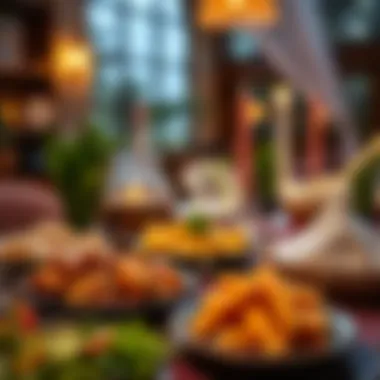
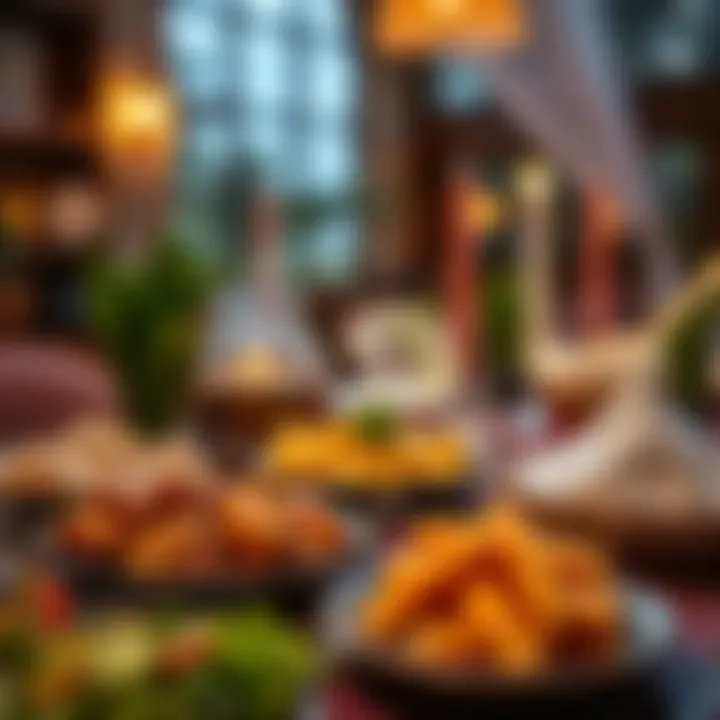
For anyone observing the fast, this requires a certain level of planning. Considerations such as travel times to communal meals, preparations for what to break the fast with, and even familial or social gatherings weigh heavy on the mind. It's not uncommon for families to begin preparing an hour or two before the Iftar time approaches to ensure everything is ready to go.
Here are a few things to keep in mind regarding scheduling:
- Listen for the Call to Prayer: In many neighborhoods, the call is promptly followed by the Iftar breaking, making it a traditional cue.
- Stay Updated with Community Calendars: Many mosques hand out calendars that outline daily prayer schedules, including Iftar times.
- Leverage Technology: There are multiple apps tailored to inform users about prayer times, which is especially useful in areas where one may not hear the call.
Understanding Iftar timings is crucial not only for compliance but also for participating in the rich cultural practice that forms the backbone of community life during Ramadan in Dubai.
Variations Across Different Locations
During Ramadan, the act of breaking fast, known as Iftar, takes on unique forms throughout Dubai, reflecting diverse cultural practices and lifestyle differences. Recognizing the variations across different locations within the city is essential for understanding how the spirit of Ramadan is celebrated distinctly in urban and rural settings and how community practices surface in these areas.
Urban vs. Rural Settings
In Dubai's bustling urban environments, the atmosphere during Iftar is vibrant and lively. Big hotels and high-end restaurants offer elaborate buffets, featuring traditional dishes alongside international cuisine. It becomes a social event where many gather, with families often reserving tables weeks in advance to secure their spots. The sound of the call to prayer resonates from mosques, and at sunset, you will observe streets bustling with people rushing to their iftar appointments.
On the other hand, rural areas may present a more intimate approach to Iftar. Here, families often break their fast at home, emphasizing the importance of togetherness. The emphasis is usually on personal touches with homemade meals, featuring regional specialties. In these settings, communal iftars might be held in neighborhood mosques, fostering a sense of community.
Interestingly, both urban and rural settings have their own charm. Urban life pulses with excitement and options, while rural gatherings emphasize closeness to family and traditions. Community spirit is felt more prominently in rural locations, where each Iftar can often feel like a home-cooked meal shared among friends and neighbors. But this isn’t to overshadow urban convenience, where the array of choices caters to various tastes, combining comfort and modernity.
Community Practices
Community practices around Iftar can differ considerably not only between urban and rural areas but also among various cultural groups within Dubai. For instance, certain expatriate communities host their own Iftar events that reflect their culinary heritages. These gatherings become a fusion of cultures, where individuals not only break bread together but also exchange stories and traditions.
Moreover, Ramadan tents set up by businesses and local governments in public spaces often offer complimentary meals to those in need, which highlights yet another layer of community spirit. These initiatives provide nourishment and build bonds among people of different backgrounds.
Key aspects of community gatherings may include:
- Shared meals: Many come together in public parks or community centers for a communal Iftar.
- Cultural events: During Ramadan, various cultural performances and activities are organized, promoting local art and traditions.
- Charity and giving: Contributing to the less fortunate during Iftar is a prevalent practice, as many see it as an opportunity for charitable outreach.
Technology and Iftar
In today's fast-paced world, technology has woven itself into the fabric of our daily lives, influencing various aspects of culture and tradition. When it comes to celebrating iftar during Ramadan in Dubai, technology plays a pivotal role in ensuring that individuals and families stay connected and informed, enhancing the overall experience of this significant ritual.
The advent of digital platforms has transformed how people engage with the iftar community, while also providing crucial information regarding timings and dining options. The benefits of this technological integration are manifold, making it an essential component of the modern iftar experience in Dubai.
Apps and Online Timings
Mobile applications dedicated to Ramadan offer practical solutions for tracking iftar timings with remarkable precision. These apps often feature localized content that adjusts to the observer's geographical location, ensuring that users know precisely when they can break their fast.
Most of these applications even include:
- Customized Timings: Users can set their location, allowing for tailored notifications that alert them moments before iftar is due.
- Prayer Times: Alongside iftar notifications, many apps provide daily prayer timings, lending a context that deepens the spiritual atmosphere of Ramadan.
- Community Features: Some apps allow users to connect with friends or family members to share timings or discuss preparations for iftar meals, keeping the social aspect alive even when physically apart.
The user interface of these apps is often designed to be straightforward, providing all necessary information at a glance. This user-centered approach ensures that newcomers to this tradition can navigate the iftar landscape with ease.
Social Media Influence
Social media has become the new town square, where people gather to share experiences, recipes, and traditions related to iftar. Platforms like Facebook, Instagram, and Twitter are bustling with posts showcasing everything from traditional dishes to modern culinary twists on iftar meals. Influencers upload content that inspires millions, encouraging creativity in both food presentation and gathering ideas.
Additionally, community groups on these platforms facilitate discussions about:
- Local Events: Many users share upcoming public iftar events, broadening participation and engagement among members of the community.
- Health Tips: With the focus on health generally rising, social media is ripe with advice on how to maintain balance during iftar. This includes nutritional information and cooking tips that help individuals make informed decisions regarding their meals.
- Connectivity with Loved Ones: For those physically separated from family, social media allows them to partake in virtual iftar gatherings, sharing moments together even while apart.
In essence, technology serves not only as a tool but as a bridge connecting traditions with modern approaches to communal celebrations. The impact of these technological innovations on iftar observances enriches the experience, allowing for deeper engagement and understanding among all participants.
"Embracing technology doesn't sideline tradition; it enhances community ties while allowing for personal expression handcrafted on the platter."
As consumers and participants embrace new methods for marking this sacred time, one can only imagine how technology will continue to innovate the experience of iftar in Dubai, shaping future Ramadan traditions.
Culinary Aspects of Iftar
The culinary aspects of iftar hold a central place during Ramadan in Dubai, showcasing a vibrant mix of tradition and modernity. This breaking of the fast is not simply a meal; it is a culmination of spiritual reflection and communal ties. Food plays a key role in celebrating these bonds, transforming iftar into a sensory experience for family and friends. Varieties of dishes reflect the multicultural nature of Dubai, where Arabic, Asian, and international cuisines intertwine to create a feast that appeals to all.
Traditional Dishes
When evening falls, signaling the end of a day of fasting, traditional dishes take center stage at iftar tables across Dubai. One cannot discuss iftar without mentioning dates and water, which are often the first items consumed to break the fast. This practice dates back to the traditions of the Prophet Muhammad, who is said to have broken his fast with these very items.
As the evening progresses, more elaborate dishes start to appear. Luqaimat, a sweet dumpling drizzled with date syrup, is a must-have. It reflects the richness of Emirati heritage and continues to be a favorite among both young and old.
Other popular choices include:
- Shorbat Adas (lentil soup), often served hot and comforting, crucial for replenishing energy.
- Samboosa, a pastry with savory fillings, typically filled with spiced meats or vegetables, providing a satisfying crunch.
- Biriyani, where spiced rice is layered with tender meat, emblematic of the larger Middle Eastern culinary influences.
These dishes not only satisfy hunger but also evoke a sense of nostalgia, reminding many of family gatherings and cherished memories.
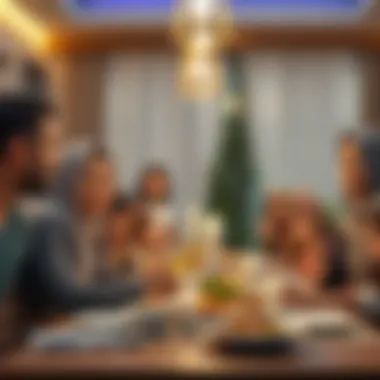
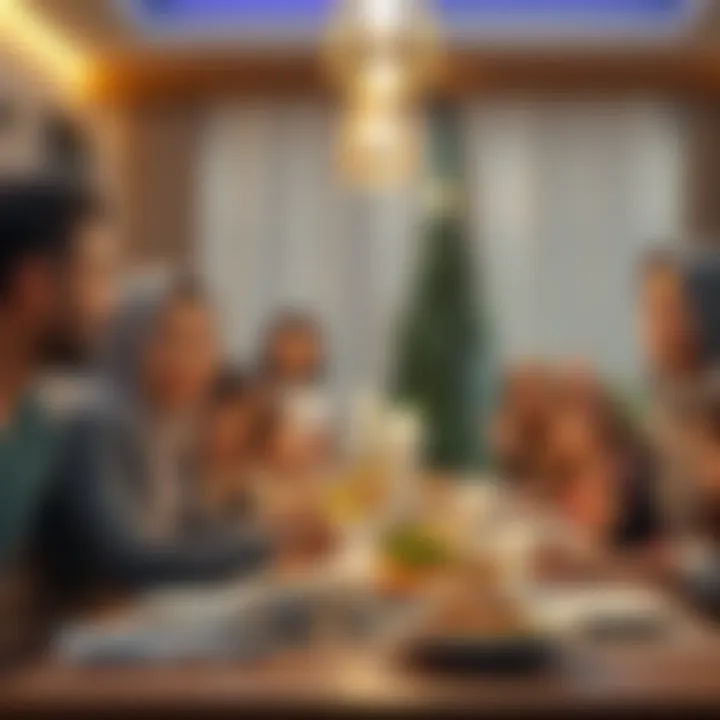
Modern Trends
As the culinary landscape evolves, so do the traditions surrounding iftar. Modern trends in Dubai introduce innovative dishes and new culinary concoctions that reflect contemporary tastes. Restaurants compete to present extravagant iftar buffets, with options ranging from sushi platters to gourmet burgers, proving that the sky's the limit.
Health-conscious choices also emerge more prominently during Ramadan. Many establishments now offer lighter, healthier menu options such as:
- Quinoa bowls featuring various toppings.
- Grilled fish paired with fresh salads, allowing guests to indulge without the heaviness that often accompanies traditional fare.
Furthermore, the rise of fusion cuisine adds a creative twist. Imagine truffle-infused hummus or spicy kimchi falafel to elevate the typical iftar experience. As Dubai continues to attract tourists, the integration of global flavors becomes more evident.
In essence, the culinary aspects of iftar encapsulate the spirit of Ramadan in Dubai, blending tradition with modern innovation, ensuring that every meal is not only a feast for the stomach but also for the soul.
"Food is an integral part of our culture, and during Ramadan, it serves as a bridge bringing people together, bridging the past with the present."
The array of dishes is a testament to the diversity and rich tapestry of Dubai, making iftar a truly unique experience.
Health Considerations During Iftar
During Ramadan, iftar is not just a meal; it represents a vital transition from fasting to nourishment. This section emphasizes the importance of being mindful about health during iftar. Balancing nutrition and hydration is essential for maintaining well-being, especially after a day of fasting.
Nutritional Balance
Achieving a proper nutritional balance during iftar is key for rejuvenating the body. After fasting from dawn, people often rush to dig in, which can lead to overeating and mismanagement of food choices. Ideally, one should begin with dates and water, as this helps restore energy levels without overwhelming the digestive system.
It's recommended to include a variety of food groups:
- Complex Carbohydrates: Whole grains like brown rice or whole-wheat bread provide sustained energy.
- Proteins: Sources such as grilled chicken, fish, or legumes can aid in muscle recovery.
- Healthy Fats: Nuts and avocado can be beneficial for heart health.
- Vegetables: Leafy greens and colorful veggies not only add essential vitamins but also help in digestion.
Eating in moderation and choosing nutrient-dense foods can avoid that sluggish feeling which often follows a large meal. One might say, "it’s not about how much you eat, but what you eat," especially during this time.
Hydration Needs
On a hot day, hydration needs skyrocket, particularly after a long stretch without a drop to drink. Proper hydration is crucial, as it helps in digestion, maintains energy levels, and supports overall bodily functions. After a day of fasting, many neglect their water intake during the iftar meal, leading to dehydration, fatigue, and reduced alertness.
Best practices include:
- Start your iftar with a glass of water to begin rehydrating the body.
- Aim for at least 8 cups of water between iftar and suhoor (the pre-dawn meal) to meet hydration needs.
- Incorporate hydrating foods like cucumbers, watermelon, and soups, which also double as refreshing options.
- Avoid caffeinated drinks that can lead to dehydration the next day.
"Drink water, it’s the simplest thing you can do to stay healthy and alert during Ramadan!"
Being conscious of both nutritional balance and proper hydration during iftar not only enhances the physical health during Ramadan but also fosters a mindful approach to eating. This balances the joy of breaking fast with the responsibility of maintaining one’s health.
Community Gatherings and Events
Community gatherings and events during Ramadan have a vital role, especially in a culturally rich city like Dubai. These occasions are more than mere social get-togethers; they reflect the communal spirit and shared experiences that define the holy month.
Gathering for iftar, the meal to break the fast, is not just about the food; it embodies unity and solidarity among members of the community. When the call to prayer is heard, families and friends flock to mosques or designated public spaces to enjoy their evening meal, creating an infectious atmosphere of excitement and camaraderie.
Public Iftar Events
Public iftar events are often organized in various parts of Dubai, frequently housed in parks, community centers, and mosques. These events cater not only to locals but also to tourists and expatriates, showcasing the essence of Dubai's hospitality.
Key aspects of public iftar events include:
- Accessibility: Many of these gatherings are free or low-cost, making them available to people from all walks of life, helping everyone feel included.
- Culinary Diversity: Participants can experience a multitude of dishes that reflect the cultural backgrounds of the attendees. Middle Eastern specialties, Asian influences, and other regional flavors combine to create a delightful buffet for patrons.
- Family-friendly Atmosphere: Most events cater to families, providing a safe and enjoyable environment for children. Activities for kids, such as arts and crafts, often accompany the meals, allowing parents to relax knowing their children are entertained.
Public iftar events not only satisfy hunger after a long day of fasting but also foster understanding and relationships between various cultural groups.
Family and Friends Gatherings
Family and friends gatherings during iftar hold their own distinct charm. Breaking fast in a loved one's presence amplifies the joy of the meal. These intimate gatherings often involve preparation that everyone contributes to, be it cooking, table setting, or simply bringing dishes from their homes.
Benefits of these gatherings can include:
- Strengthening Bonds: Getting together for iftar can solidify relationships. Sharing stories and laughter at the dinner table adds a layer of warmth to the whole experience, making each bite taste richer.
- Celebrating Traditions: Each family often has unique customs, from special recipes passed down through generations to particular ways of inviting guests. These traditions can be preserved and nurtured through gatherings, providing a sense of identity.
- Support Systems: Iftar can offer a moment for families and friends to discuss their challenges and achievements during Ramadan. The supportive environment can foster discussions that help alleviate the stress one might feel during this month.
As such, whether it’s a large public event or a cozy meal at home, the essence of iftar resonates within the community, creating an opportunity to foster friendships, understand diverse cultures, and celebrate common values.
Challenges Faced During Ramadan
During Ramadan, the holy month of fasting, the daily rhythms of life in Dubai shift significantly. While it brings the community together and deepens spiritual connections, it also introduces a number of challenges that individuals and families must navigate. Understanding these challenges is crucial for both residents and visitors to appreciate the nuances of life in the emirate during this time.
Work-Life Balance
Finding the right equilibrium between work and the observance of Ramadan can be a delicate balancing act. The work culture in Dubai often demands long hours, but during Ramadan, the expectations shift. Many companies adjust their working hours, typically reducing them to accommodate those who are fasting.
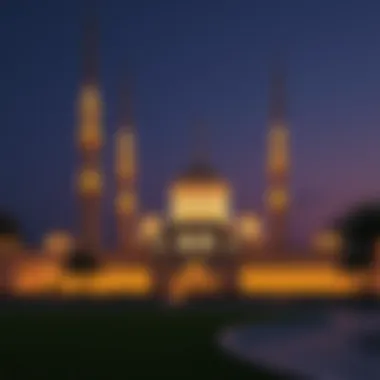
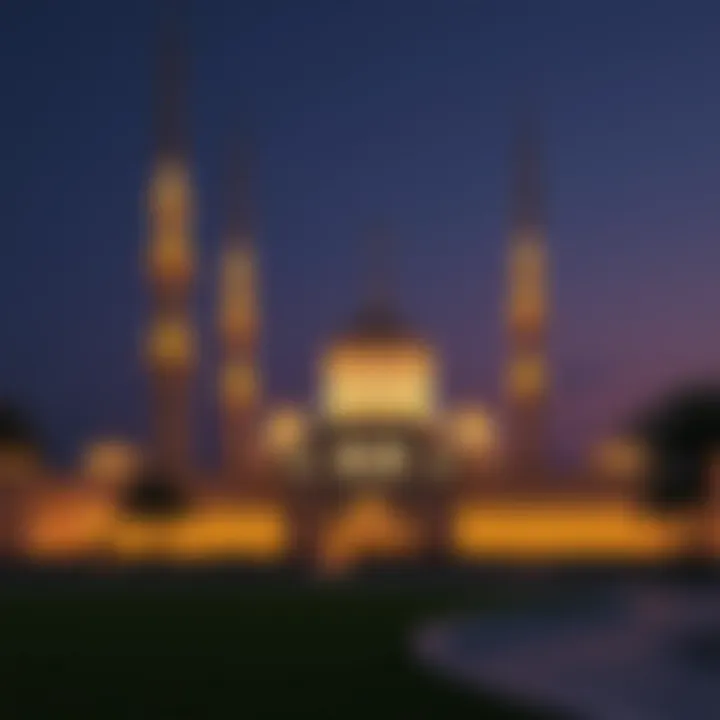
This reduction can feel like a double-edged sword. On one hand, it's a relief for those who are fasting; on the other hand, it often leads to an increase in workload during these shortened hours. Employees might end up feeling the pressure to complete their tasks in a smaller time frame, making it crucial for them to manage their time effectively.
Additionally, some individuals may feel exhausted and less productive by the time iftar arrives, as fasting can take a toll on energy levels. This highlights the importance of self-care and how vital it is to keep a consistent schedule that allows for rest, hydration, and breaks. Simple things like taking a short walk before iftar or squeezing in a quick nap can help refresh the mind and body.
Social Obligations
Ramadan is also a time where social dynamics evolve. The month fosters a spirit of camaraderie and collective celebration, yet it can come with heavy social obligations. Friends and family often gather for iftar, leading to a sincere but sometimes overwhelming sense of commitment. Every evening can feel like a whirlwind of invitations and expectations.
While these gatherings are essential for community bonding, they may also lead to feelings of obligation rather than joy for some. Participants can find themselves wrestling with the desire to engage socially while honoring personal limits. It's important to use clear communication to express needs, whether that means declining an invitation or suggesting a quieter gathering after iftar.
Moreover, those who are new to the social culture might feel uncertain about the unspoken norms during Ramadan. For instance, arriving late to an iftar might not be seen favorably, and there’s often an expectation to bring a dish to share, which can be daunting. The need for cultural sensitivity can be overwhelming for those unfamiliar with the customs.
Effect on Daily Life
The effect of iftar timings on daily life in Dubai is substantial, influencing routines and shaping social interactions during the holy month of Ramadan. This period is not merely about fasting; it also serves as an opportunity for communities to come together and reflect. Understanding how iftar integrates into daily life is crucial for both residents and visitors who wish to navigate this unique cultural landscape.
Business Hours
In Dubai, business hours adapt notably during Ramadan. Many organizations shift to shorter working hours, allowing employees to finish their tasks before the iftar meal. A common practice is a reduction of the standard workday to around six hours, typically beginning in the morning and closing by mid-afternoon.
This alteration aligns well with the needs of the workforce who are fasting and helps them to maintain productivity without compromising their religious observances. However, hours may vary between public and private sectors. For instance, government offices might operate from 9 AM to 2 PM, whereas private businesses sometimes adopt more flexible timings, starting later in the morning or closing earlier.
Here are some key considerations regarding business hours during Ramadan:
- Family Time: Shortened hours allow for family gatherings. Co-workers might even break their fast together, enhancing workplace camaraderie.
- Retail Adjustments: Shopping venues often extend their hours into the night, creating a vibrant atmosphere post-iftar, which is highly appreciated by many.
- Client Interactions: Businesses that engage with clients should be aware of these adjustments, perhaps scheduling meetings around iftar times to accommodate everyone involved.
School Scheduling
School scheduling during Ramadan also sees shifts to accommodate the needs of students and families observing the fast. Educational institutions often adjust their daily schedules, starting classes later to ensure students can have adequate rest and stay refreshed throughout the day. This may result in altered school hours, typically beginning around 9 AM or even later, depending on grade levels.
What's important to note is the impact this has on the students themselves:
- Academic Focus: Adjusted school hours encourage students to concentrate better, as many struggle with hunger or fatigue if lessons commence too early.
- Parents' Convenience: Extended mornings give parents the flexibility to assist their children in daily activities while also ensuring they can prepare for iftar.
- Cultural Education: Schools often incorporate teachings about Ramadan into the curriculum, enhancing cultural understanding among students from various backgrounds.
"The observance of iftar significantly influences the rhythm of daily life, from when businesses operate to how educational experiences are structured, painting a vivid portrait of cultural adaptation in a bustling city."
Overall, the intricacies of iftar timings during Ramadan highlight the adaptability and richness of life in Dubai, offering a unique blend of spirituality, community, and cultural expression. This understanding fosters greater appreciation for the city's diverse practices and gives both residents and visitors a way to connect with the local customs.
Tourism and Iftar
Iftar holds a significant place in the daily lives of many in Dubai, especially during Ramadan. For tourists navigating this vibrant city, understanding the nuances of iftar can elevate their travel experience. The convergence of local customs and the influx of international visitors during this holy month brings about a unique atmosphere that’s both inviting and rich in culture. Through this lens, we can appreciate how iftar serves not just as a religious observance, but also as an essential element of Dubai's tourism landscape.
Iftar for Visitors
For tourists, iftar offers an enchanting opportunity to immerse themselves in Emirati culture. Many hotels and restaurants tailor their offerings to accommodate visitors seeking to partake in this cherished meal. Travelers can enjoy magnificent buffets that showcase a mix of traditional dishes like dates, lentil soup, and harees, alongside modern creations designed for diverse palates.
Some notable experiences to consider include:
- Organized Iftar Dinners: Popular venues such as The Arabian Tea House gain a lively reputation as they serve traditional meals against a backdrop of Arabian hospitality.
- Desert Iftar Experiences: Adventurous tourists can opt for desert excursions where iftar is enjoyed under the starlit sky, providing a picturesque setting that blends nature with culture.
- Dubai Mall Events: During Ramadan, the Dubai Mall hosts public iftar gatherings that not only cater to locals but also draw tourists eager to learn and share in the communal experience.
This makes iftar a great selling point for travel agencies looking to attract clients during the holy month while ensuring visitors leave with a taste of local life.
Cultural Awareness for Tourists
While the culinary delights and festive gatherings are appealing, tourists should approach iftar with a sense of cultural awareness. Respecting the sacredness of Ramadan is crucial. Visitors who are accustomed to a fast-paced lifestyle may speed through the city with little thought of how the sacred month influences daily routines.
Consider the following:
- Time Sensitivity: Iftar occurs at sunset, and many restaurants and communal tents focus on providing meals at this precise moment. Tourists should plan accordingly, understanding that heeding local timings enriches their experience.
- Dress Etiquette: Modesty matters in Dubai. During Ramadan, it is advisable to wear clothing that covers shoulders and knees, particularly in public areas.
- Avoid Eating in Public: While it may be tempting to grab a snack, tourists should try to refrain from eating or drinking in public spaces during daylight hours. It’s a matter of courtesy and respect for those who are fasting.
"Tourism during Ramadan not only highlights Dubai's vibrant culture but also reflects a deep respect for its traditions. Visitors who educate themselves and adapt will find a more enriching experience."
Tourism and iftar weave together to create a tapestry of connection and understanding in Dubai. With a little knowledge and respect for the customs, visitors can truly savor the experience of iftar against the backdrop of this bustling and diverse metropolis. Those who grasp the significance of this ritual will not only enjoy a meal but also a deeper bond with the culture and its people.
Culmination
Understanding the significance of iftar timings in Dubai is crucial for engaging with the cultural and religious fabric of the city during Ramadan. It is more than just a time to break fast; it represents moments of connection, reflection, and community. The rituals surrounding iftar create an environment that fosters unity among family, friends, and even strangers who gather to share a meal.
As one navigates through the nuances of daily life during this holy month, it becomes evident that timely iftar can greatly influence not just individual well-being but also communal experiences. The anticipation of iftar, marked by the call to prayer, instills a sense of purpose and rhythm in the lives of many. Residents and visitors alike find themselves drawn into a celebration of culinary traditions, the joy of fellowship, and the richness of cultural practices. Thus, the timing of iftar can empower individuals to honor their faith and build bridges across different communities.
Moreover, a deeper understanding of iftar timings can contribute to addressing logistical challenges during Ramadan. This awareness can aid businesses in adapting their hours, which ensures that they meet the demands of both local populations and tourists. By recognizing the influence of this special time, stakeholders such as investors, homebuyers, and agents can make more informed decisions that resonate well with community values and enhance their operations.
Recap of Key Points
- Cultural and Religious Significance: Iftar marks the end of fasting, representing faith and unity among individuals.
- Determining Iftar Times: Astronomy and local interpretations play key roles in establishing the correct timing for iftar.
- Urban-Rural Variations: Different locations in Dubai may observe Iftar at varied times influenced by community practices and lifestyles.
- Technology's Role: The emergence of apps and online resources facilitates easy access to accurate iftar timings for both residents and tourists.
- Health and Nutrition: Being mindful of hydration and nutritional balance during iftar can promote wellness throughout Ramadan.
- Societal Impact: Understanding the dynamics of iftar can aid businesses in adjusting operations to cater to the unique needs presented in the holy month.
Final Thoughts
In essence, grasping the nuances of iftar timings in Dubai not only enriches the experience of Ramadan but can also serve as a powerful tool for various stakeholders. As the city thrives on its vibrant multicultural fabric, understanding the time of iftar can lead to more meaningful interactions and enhance social ties. The rhythms of Ramadan underscore the importance of respecting traditions while also embracing modernity. Investors, homebuyers, and analysts have a unique opportunity to align their goals with the sentiments that bring residents together, paving the way for a more harmonious community.
By integrating this knowledge, all parties involved can contribute to a richer understanding of this cherished practice, ensuring that the essence of iftar continues to shine brightly in Dubai, whether through communal gatherings or individual reflections.















